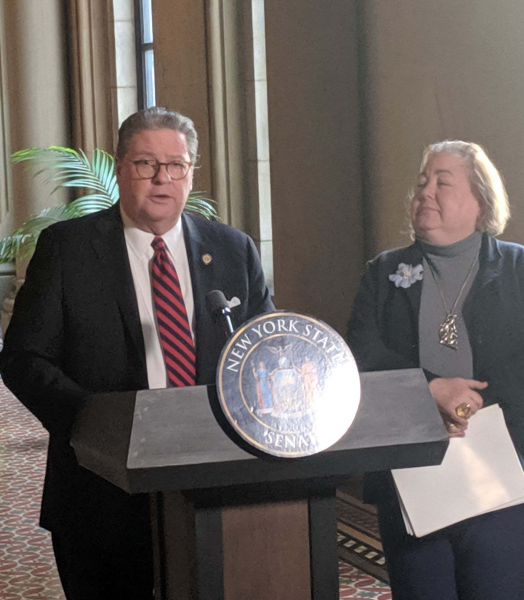Senator Harckham Announces Support for Marijuana Legislation

New York State Senator Pete Harckham (D-Mt. Kisco) last week announced his support for marijuana legalization that includes investments in substance abuse disorder treatment, mental health programs and education efforts aimed at highlighting the risks of marijuana use.
In addition, Harckham, serving his first term, wants revenue from taxed dispensary sales following legalization to pay for increased enforcement of DUI laws.
Harckham outlined his conditional support for marijuana legalization at a press conference held at the New York State Capitol alongside State Senator Liz Krueger, chair of the Senate Finance Committee, who sponsored the Marijuana Regulation and Taxation Act (S.1527B). The legislation, which was not passed during the 2019 legislative session, now includes the provisions regarding investing a portion of the revenue, 25%, toward treatment, education and prevention. Additional resources would be dedicated to local law enforcement to enhance DUI enforcement.
“The bottom line is this: I’m for the legalization of marijuana in the State of New York,” said Harckham, chair of the Senate Committee on Alcoholism and Substance Abuse. “But it must be legalization specifically with improvements that guarantee the safety and well-being of our residents in regard to added spending on community policing of DUI and comprehensive education and communication efforts that point to the risks of marijuana use; and 25% of revenue, and not a dollar less, going toward treatment and safety net programs, including Substance Use Disorder and community mental health programs.”
Legalization of marijuana concerns many residents, according to Harckham, because of unresolved issues related to the operation of motor vehicles while under the influence of the drug, use by high school students and the documented effect of the drug on developing young brains, and legalization-related problems experienced in other states, like Colorado and California. There is also a broad feeling that marijuana leads to other riskier behaviors.
But Harckham said that his discussions with educators and law enforcement officials pointed to vaping and binge drinking as the biggest concerns regarding young people, and that in states with legalization there was not a sizable spike in marijuana use among teens and young adults.
“The key point here is Senator Krueger listened to the concerns of my constituents and others around the state, and amended her legislation as a result,” said Harckham.
The amended marijuana legislation adds more money for police to ensure that DUI is kept in check, and for schools to educate young people on the risks associated with marijuana. The legislation now allows individual school districts to make their own plans for educating their students; municipalities to opt out; and municipalities to carefully establish zoning for marijuana retailers and growers.
The legislation also ensures that the sales tax on marijuana creates revenues that can be invested in communities around the state, 25% of which will specially earmarked for education, treatment and prevention.
“It is obvious we are in a crisis, which we are failing to meet through disinvestment in Substance Use Disorder Treatment and Community Mental Health Programs,” Harckham said, “What I learned from dozens of hearings and meetings with stakeholders is this: the safety net for substance use disorders is in tatters, and we need to invest right now to start turning things around. Senator Krueger’s legislation, the Marijuana Regulation and Taxation Act, will ensure that 25% of the total state revenue from marijuana sales will go toward Substance Use Disorder treatment programs and education. This will be the lifeline for our communities, our mental health programs and our residents.”

Rick has more than 40 years’ experience covering local news in Westchester and Putnam counties, running the gamut from politics and crime to sports and human interest. He has been an editor at Examiner Media since 2012. Read more from Rick’s editor-author bio here. Read Rick’s work here: https://www.theexaminernews.com/author/pezzullo_rick-writer/
